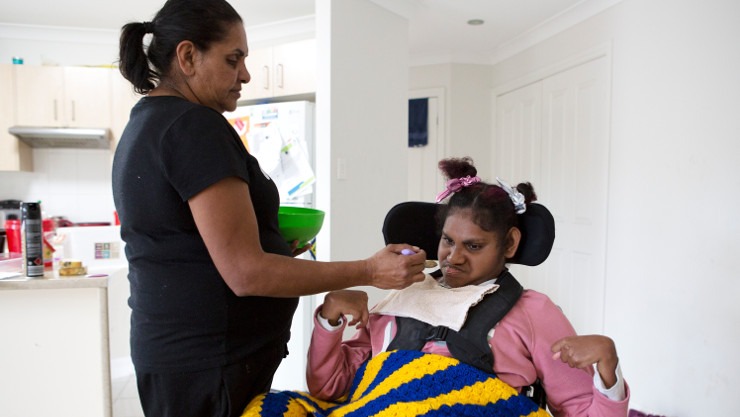
Swallowing – some facts for people with intellectual disability
1. What is it?
Swallowing difficulty = problems swallowing.
Swallowing difficulty can affect how a person can eat food, drink fluids, and take medication. It can affect how people can swallow their saliva.
Swallowing is complex – it involves a lot of muscles and nerves in the body.
2. How common is it?
Swallowing difficulty is very common. It affects most people with an intellectual disability.
Swallowing difficulties can be ‘mild’ ‘moderate’ ‘severe’ or ‘profound’.
3. How does it affect people’s lives?
Difficulty swallowing can be a danger to a person’s health.
It can affect different people in many different ways.
Swallowing difficulty can cause problems with nutrition and with respiratory health. It can also cause choking and death. It can impact on enjoyment and wellbeing.
Swallowing difficulty can increase as people with intellectual disability get older – even over 25 or 30 years of age.
4. What are the signs?
Some of the signs of swallowing difficulty can be:
- Problems with chewing or moving the food backwards in the mouth
- Foods left over in the mouth after meals
- Coughing – coughing more – or coughing on a wider range of foods or fluids
- Choking, food getting stuck in the airway, needing to be cleared
- Increased chest infections or hospitalisation
- Losing or gaining weight without trying to
- People might start to say they ‘don’t like’ something they used to like eating
- Meats and salads might become more difficult to chew
- Hard or stringy foods might become more difficult to swallow
- People might also begin to experience more respiratory illnesses, or go to hospital more often.
4. What can be done to help?
There are a lot of ways to manage swallowing difficulties, so that you can keep enjoying foods and drinks.
It is important to see a speech pathologist for an assessment of your swallow and for advice on what to do about it.
There are a lot of things that can help people with swallowing difficulty. Many things can be adjusted to help the person to manage foods more safely. This can include the food, drinks, mealtime equipment, assistance provided, and ways of eating or drinking.
Whatever the person needs, a speech pathologist and the doctor and other health professionals work with the person to help to find ways to help.
5. Biggest tip
Seek advice: tell your doctor and ask to see a speech pathologist for help if you are worried about your swallowing.
It is important to seek medical attention and the advice of a speech pathologist. Problems swallowing can be a sign of other health conditions.
Seek advice as early as possible.
Read about our Hard to Swallow campaign win that secured NDIS funding for swallowing therapies.
This was a guest post written for CID by Associate Professor Bronwyn Hemsley, Certified Practicing Speech Pathologist, The University of Newcastle, NSW, Australia



 1800 424 065
1800 424 065 














